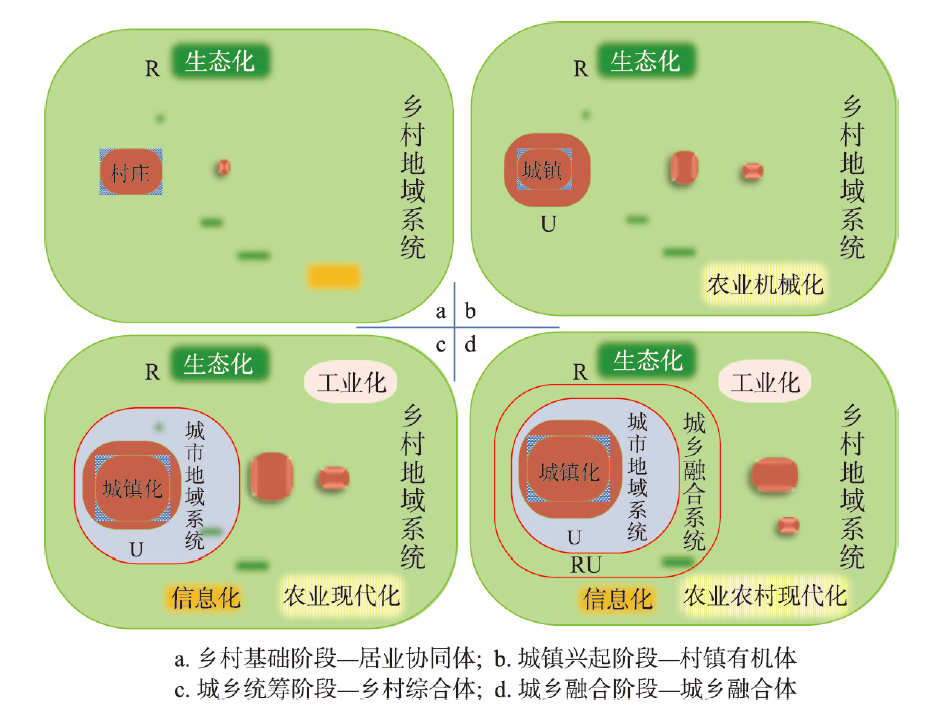

Human geography research based on the new thinking of global rural-urban relationship
Received date: 2021-02-28
Request revised date: 2021-08-15
Online published: 2022-02-25
Supported by
National Natural Science Foundation of China(41931293)
Copyright
Sustainable rural development is critical to the achievement of global sustainable development goals. Globalization and urbanization, as the key processes, continuously drive the human-earth system to make adaptive responses, promoting the transformation of urban-rural relations. The rural-urban relationship is essentially a mother-child relationship, which is a comprehensive characterization of the transfer of rural humanistic factors, the transformation of man-land relationship and the transformation of urban-rural development in the process of urbanization. However, the traditional cognition of urban-rural relationship ignores the multi-dimensional connections between the rural and the urban as well as the existence of the rural-urban integration system, resulting in prominent drawbacks of rural regions, negatively affecting the urban-rural development rights, and resulting in urban and rural territorial dysfunction and other problems. The key to solve the problems of socio-economic development in China is to reform the urban-biased development strategy, and to innovate the new cognition of rural-urban relationship based on the thinking of "rural maternal effect", which highlights that rural areas nourish the city. Based on the remote coupling and systematic synthesis of the rural human-earth system, modern human geography urgently needs to strengthen the cross-research with physical geography and information geography, create a coordinated observation system of human-earth system supported by the sky-space-ground integration, reshape the global rural development perspective, rural-urban system perspective, and reorganize the global rural human-earth relationship, the rural-urban integration relationship, and the living and employment relationship. Rural human-earth relationship territorial system is the core of rural geography research. The rural human-earth system research should focus on the coupling of rural natural ecosystem and the socio-economic system and their complex interactive processes and effects. Supported by the intersection of multiple disciplines, the expansion of new fields and the cultivation of new disciplines, it should create the collaborative observation technology of human-earth system and methodology of multi-source data fusion computing, the research idea based on process-mechanism-pattern and the technical path of monitoring-simulation-decision support, and explore the organic connection path between rural human-earth system coupling and rural-urban integrated development, regional sustainable development and global common governance.

LIU Yansui , LONG Hualou , LI Yurui . Human geography research based on the new thinking of global rural-urban relationship[J]. Acta Geographica Sinica, 2021 , 76(12) : 2869 -2884 . DOI: 10.11821/dlxb202112001
表1 全球乡村地理学研究体系Table 1 Research system of global rural geography |
| 尺度 | 内容 | 变化与挑战 | 目标 | 研究方法与手段 |
|---|---|---|---|---|
| 跨国及全球 (人地圈) | 全球乡村发展与人地关系 | • 全球环境变化影响 • 国际粮食贸易挑战 • 全球农业生态危机 • 全球贫困治理难题 • 疫情危及健康安全 | • 优化调控人地关系 • 推进全球农业发展 • 促进全球生态保护 • 推动全球贫困治理 • 人类健康保障机制 | 宏观尺度研究: • 遥感与GIS技术 • 大数据应用 • 风险评估 • 网络分析 中观尺度研究: • 协同观测 • 定量模拟 • 预测预警 微观尺度研究: • 定量评估 • 定位监测 • 参与式调查 |
| 国家及区域 (城乡圈) | 城乡融合格局与乡城关系 | • 国家粮食供求危机 • 区域农业经济衰退 • 城乡收入差距拉大 • 区域生态退化风险 | • 提高粮食安全水平 • 促进农业经济增长 • 缩小城乡收入差距 • 保护区域生态安全 | |
| 村镇及农户 (村镇圈) | 村镇功能优化与居业关系 | • 村镇土地空废问题 • 社会福利保障低下 • 人居环境质量恶化 • 乡土文化日渐衰微 | • 提升土地功能价值 • 提供基本社会保障 • 改善聚落人居环境 • 传承特色乡土文化 |
| [1] |
[刘彦随. 现代人地关系与人地系统科学. 地理科学, 2020, 40(8): 1221-1234.]
|
| [2] |
|
| [3] |
[毕思文. 地球系统科学综述. 地球物理学进展, 2004, 19(3): 504-514.]
|
| [4] |
[徐冠华, 葛全胜, 宫鹏, 等. 全球变化和人类可持续发展: 挑战与对策. 科学通报, 2013, 58(21): 2100-2106.]
|
| [5] |
|
| [6] |
[傅伯杰. 联合国可持续发展目标与地理科学的历史任务. 科技导报, 2020, 38(13): 19-24.]
|
| [7] |
|
| [8] |
|
| [9] |
|
| [10] |
|
| [11] |
|
| [12] |
[王伟中, 陈滨, 鲁传一, 等. 《京都议定书》和碳排放权分配问题. 清华大学学报(哲学社会科学版), 2002, 17(6): 81-85.]
|
| [13] |
[李玉恒, 阎佳玉, 武文豪, 等. 世界乡村转型历程与可持续发展展望. 地理科学进展, 2018, 37(5): 627-635.]
|
| [14] |
|
| [15] |
[刘彦随, 周扬, 刘继来. 中国农村贫困化地域分异特征及其精准扶贫策略. 中国科学院院刊, 2016, 31(3): 269-278.]
|
| [16] |
|
| [17] |
|
| [18] |
[张英男, 龙花楼, 马历, 等. 城乡关系研究进展及其对乡村振兴的启示. 地理研究, 2019, 38(3): 578-594.]
|
| [19] |
[刘彦随. 中国新时代城乡融合与乡村振兴. 地理学报, 2018, 73(4): 637-650.]
|
| [20] |
[何仁伟. 城乡融合与乡村振兴: 理论探讨、机理阐释与实现路径. 地理研究, 2018, 37(11): 2127-2140.]
|
| [21] |
[习近平. 把乡村振兴战略作为新时代“三农”工作总抓手. 奋斗, 2019(11): 1-7.]
|
| [22] |
|
| [23] |
|
| [24] |
|
| [25] |
|
| [26] |
|
| [27] |
|
| [28] |
[刘守英, 王一鸽. 从乡土中国到城乡中国: 中国转型的乡村变迁视角. 管理世界, 2018, 34(10): 128-146, 232.]
|
| [29] |
[林毅夫, 陈斌开. 发展战略、产业结构与收入分配. 经济学(季刊), 2013, 12(4): 1109-1140.]
|
| [30] |
[陈坤秋, 龙花楼. 中国土地市场对城乡融合发展的影响. 自然资源学报, 2019, 34(2): 221-235.]
|
| [31] |
[张海鹏. 中国城乡关系演变70年: 从分割到融合. 中国农村经济, 2019(3): 2-18.]
|
| [32] |
[刘彦随. 中国东部沿海地区乡村转型发展与新农村建设. 地理学报, 2007, 62(6): 563-570.]
|
| [33] |
[刘彦随. 中国乡村振兴规划的基础理论与方法论. 地理学报, 2020, 75(6): 1120-1133.]
|
| [34] |
[龙花楼, 戈大专, 王介勇. 土地利用转型与乡村转型发展耦合研究进展及展望. 地理学报, 2019, 74(12): 2547-2559.]
|
| [35] |
[赵鹏军, 于昭, 贾雨田. 中国村镇居民跨区域出行与乡村地域系统调查研究. 地理科学, 2020, 40(4): 498-508.]
|
| [36] |
|
| [37] |
|
| [38] |
|
| [39] |
[刘彦随, 冯巍仑, 李裕瑞. 现代农业地理工程与农业高质量发展: 以黄土丘陵沟壑区为例. 地理学报, 2020, 75(10): 2029-2046.]
|
| [40] |
|
| [41] |
|
| [42] |
[马恩朴, 蔡建明, 韩燕, 等. 人地系统远程耦合的研究进展与展望. 地理科学进展, 2020, 39(2): 310-326.]
|
| [43] |
[强文丽, 张翠玲, 刘爱民, 等. 全球农产品贸易的虚拟耕地资源流动演变及影响因素. 资源科学, 2020, 42(9): 1704-1714.]
|
| [44] |
|
| [45] |
[龙花楼, 张杏娜. 新世纪以来乡村地理学国际研究进展及启示. 经济地理, 2012, 32(8): 1-7, 135.]
|
| [46] |
[陆大道, 刘彦随, 方创琳, 等. 人文与经济地理学的发展和展望. 地理学报, 2020, 75(12): 2570-2592.]
|
| [47] |
[金其铭, 董昕, 张小林. 乡村地理学. 南京: 江苏教育出版社, 1990.]
|
| [48] |
[吴传钧. 论地理学的研究核心: 人地关系地域系统. 经济地理, 1991, 11(3): 1-6.]
|
| [49] |
[熊巨华, 王佳, 张晴, 等. 地理科学的学科体系构建与内涵. 科学通报, 2021, 66(2): 153-161.]
|
| [50] |
[刘彦随, 周扬, 李玉恒. 中国乡村地域系统与乡村振兴战略. 地理学报, 2019, 74(12): 2511-2528.]
|
| [51] |
|
| [52] |
[樊杰. 中国人文地理学70年创新发展与学术特色. 中国科学: 地球科学, 2019, 49(11): 1697-1719.]
|
| [53] |
[宋长青, 程昌秀, 史培军. 新时代地理复杂性的内涵. 地理学报, 2018, 73(7): 1204-1213.]
|
| [54] |
[傅伯杰. 地理学: 从知识、科学到决策. 地理学报, 2017, 72(11): 1923-1932.]
|
/
| 〈 |
|
〉 |